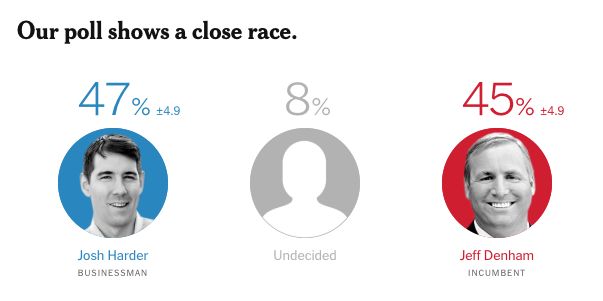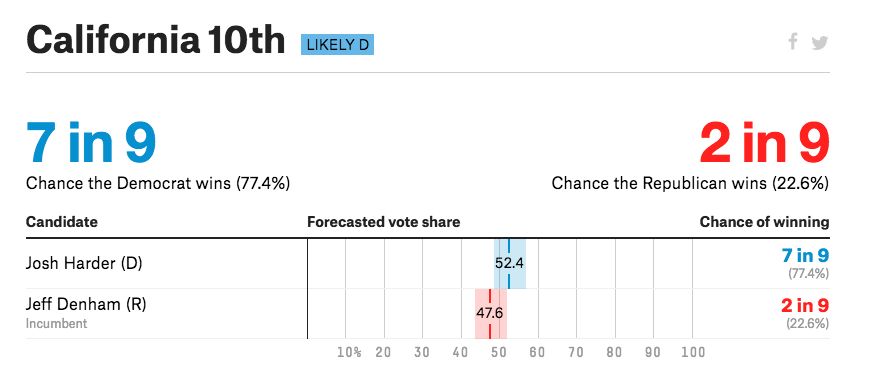3 Election Day Shockers That Could Rattle the Partisan Pundits

SAN DIEGO, CALIF. - The 2018 midterms are coming to a close. Control of Congress is at stake. The future direction of US policy on a range of issues is at stake. In many states, the future of the electoral and political process is at stake as well.
The media is obsessed with the red versus blue battle across the country in a nationalized narrative that takes away from the issues and values important to voters. They turn to the pollsters to predict a red wave or a blue wave.
Yet what if we are not seeing either?
What if what we see at the ballot box is more indicative of voters' disdain and frustration with the political status quo?
What if the media is completely missing the mark on some of these races? Here are 3 potential election day shockers the media is ignoring:
1. Wasserman Schultz vs. Tim Canova: The Biggest Upset in 2018?
US Rep. Debbie Wasserman Schulz is in a three-way race with Joe Kaufman and independent Tim Canova to retain her seat. The election has gotten minimal coverage from the media, no attention from pollsters, and is largely seen as a shoe-in for the incumbent.
But don't call the race just yet for Wasserman Schultz. The results of GOP poll released a week before Election Day show the incumbent tied with independent Tim Canova, with the Republican not being able to take advantage of the split.
If the poll numbers are close to accurate, it will be interesting to see who turnout ultimately favors. Are Democrats only concerned with keeping their congresswoman re-elected or will an energized bloc of voters show up to stick it to the establishment?
Wasserman Schultz has become a pre-eminent symbol of a system that can easily be manipulated by the two private political corporations that control it: The Democratic and Republican Parties. She was at the heart of the DNC / Bernie Sanders scandal, which ended in her resigning as DNC chair.
That wasn't the only election controversy though.
A court found that in the 2016 primary for Wasserman Schultz's congressional seat -- the first time Canova faced her in an election -- Broward County Supervisor of Elections Brenda Snipes illegally destroyed ballots.
As a result, the governor is sending someone to monitor how the county administers the election.
Snipes has met and campaigned with Debbie Wasserman Schultz, highlighting a clear conflict of interest. Canova said in an interview for IVN that he is prepared to file a lawsuit if it appears the results were rigged.
If Canova can somehow pull off a win, it will be right up there with Donald Trump among the biggest upsets in modern US politics -- and the media and pollsters won't see it coming.
2. Blue Wave? Polls May Have Key CA Congressional Races Completely Wrong
There are a handful of California congressional races that are seen as crucial to the Democrats taking the House. In fact, California independents are in a position where they could decide who ends up controlling the US House of Representatives.
However, speaking to people familiar with California politics, it appears the pollsters may not be projecting races in the Central Valley correctly -- where the most crucial House races are located. Most notably, take a look at
California's 10th Congressional District:
Source: New York Times

California's 10th Congressional District is considered a toss up in 2018. US Rep. Jeff Denham, a Republican, is defending his seat against Democrat Josh Harder. FiveThirtyEight is currently giving Harder a 77% chance of winning, but don't be surprised if the pollsters and statisticians get this race wrong.
Here's why: Pollsters tend to be creatures of habit, as IVC Media President Chad Peace discussed in the latest podcast episode of In Full Color. They base their projections on models of voter propensity from the previous midterm election. Yet much has changed in voter registration that gets overlooked.
Since 2014, for example, the number of registered nonpartisan voters has increased by half a million, while registration with the Republican and Democratic Parties has declined -- especially Republicans who are now the third-largest voting bloc in California.
Pollsters look at voter propensity in 2014 and they project the same level of turnout among nonpartisan voters. Yet, given the huge increase in nonpartisan voters, it stands to reason that turnout is likely going to be a little higher -- especially as many of these voters are party switchers, which means they are more likely than average nonpartisan voters to vote.
There is another thing to consider, especially in races in the Central Valley like CA-10: All politics is local. The battle for Congress has become so nationalized that we have forgotten that we are talking about individual districts where voters aren't concerned about a border caravan. Their top issue isn't Trump.
In CA-10, a big issue is water and access to water, so who is talking to these voters about this issue and offering voters solutions? To best understand how voters might be swayed in this district is to be on the ground.
I am not a psychic. I am not saying for certain that the pollsters are wrong here. The point is don't be surprised if they are. Don't be surprised if US Rep. Jeff Denham wins. And don't be surprised if the results of other congressional districts in battleground areas of California differ from the polls too.
3. Election Security and Voter Suppression: A Look at Georgia's Gubernatorial Election
The Georgia gubernatorial election is considered one of the most contentious, if not the most contentious gubernatorial election in the US. The three person race is between Republican Secretary of State Brian Kemp, Democrat Stacey Abrams, and Libertarian Ted Metz.
ALSO READ: In Georgia: Libertarian Gov. Candidate Says System Is Rigged; Calls Kemp, Abrams Corrupt
The current Real Clear Politics polling average shows a 2.8 point gap between Kemp and Abrams, with Kemp under 50% but leading. But multiple lawsuits have been filed against Kemp over ballot security and alleged voter suppression, a sensitive issue in today's political climate that could haunt Kemp on Election Day.
The first lawsuit says Kemp has failed to secure ballots and registered voter information, particularly after the information of over 6 million Georgia voters was hacked in 2016. The Coalition of Good Governance also filed a lawsuit in mid-October, challenging voter purges and invalidation of thousands of mail-in ballots.
The controversy around these issues may spur voters to show up on Election Day to vote, and that might not be good news for Kemp.
Stacey Abrams is also running to be the first female African-American governor in US history. Such a historic moment can have a significant impact on turnout, which has already shattered records for a midterm election.
Ultimately, though, if Ted Metz can pull enough voters, though, this election will not be decided on election night. It will go to a runoff election, which will likely have a much lower voter turnout.
Photo Credit: Lightspring / shutterstock.com



